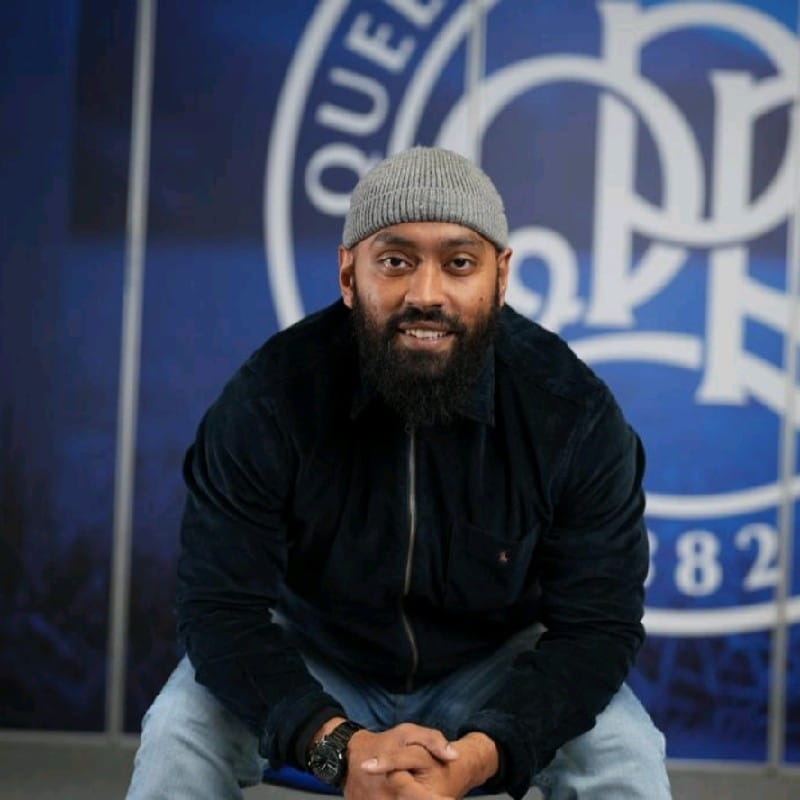Ebs Rahman explains how his not-for-profit organisation is enabling Muslim athletes to thrive
Ebs Rahman founded Nujum Sports in 2022 to provide advice, consultancy and training for sports organisations to help them be more inclusive for Muslim athletes. Nujum means ‘stars’ in Arabic and Ebs’ vision is for a world where Muslim athletes flourish and fulfil their potential – so we spoke to him to find out how Nujum is making this happen and how we can help.
Can you tell us more about Nujum Sports?
“We’re a not-for-profit organisation and currently advisors to the England and Wales Cricket Board, the Rugby Football League, and the Professional Game Match Officials in football. We have eight ambassadors across several different sports.
“Our mission is to promote a culture of educational excellence for Muslim athletes, from within a caring and secure Islamic environment, enriched with the values of discipline, mutual care and respect that extends beyond and into the wider Muslim community.
“By building, empowering and supporting a community of Muslim athletes, Nujum empowers our future generations to be positive and inspirational members of society.”
Why was it important for you to establish Nujum Sports?
“Previously, I was working for the Football Association and used to travel the length and breadth of the country to do interviews. One thing that stood out was the lack of support for Muslim athletes, there was nothing like this, so that’s where the journey started.”
What does Nujum Sports mean to you personally?
“Growing up in the 1980s in east London, I grew up around racism. Me and my friends we had to run to school because we didn’t want to get beaten up by racists. We’re always used to fighting for stuff, metaphorically obviously. That’s who I am as a person.
“If we can make life better for Muslim athletes I hope we can create more support in the whole of society, not just in sport.
“For a lot of people, men and women, who identified with a Muslim background when growing up, our faith and the sport we love – whether that’s football, cricket or running – are the two things that are dearest to us.
“My father never took me to any sports because it’s not something we do. We go to school and become doctors and lawyers. We didn’t aspire to be athletes because sport wasn’t something that we did, but I think that’s changed.”
Why do you think that’s changed?
“My dad came to the country in the 1970s, and the main thing for him was to put food on the table for us. As we evolve, as I have kids and my kids have kids, we’re third generation and fourth generation – we’re here and we’re integrating more.
“We’re feeling more comfortable and have a better standard of living, we’re not constantly worrying about putting food on the table like our dads and grandfathers were. We’re more in a position to enjoy sport.”

Ebs Rahman
Is it important for sports organisations, including the TCS London Marathon, to become more knowledgeable about Islam and Muslim athletes and participants?
“There are currently around four million Muslims in the UK, just over five per cent of the entire population, which is quite high.
“If the London Marathon is held in April, throughout that time you’ll have at least three different prayer times. Participants will need a space where they can pray, the hydration drinks and any sort of snacks will need to be halal. Doing that will increase participation from Muslim runners.
“I think you should look after the faith needs of every religion – Jewish, Hindu, Christian. You’ll find that faith is important to a lot of people and by catering for them, you’ll increase participation from different faith groups.”
What advice do you have for any Muslim participants who will be observing Ramadan while training for the TCS London Marathon at the same time?
“I’ve never done any long-distance running, 26.2 miles is tough – I wouldn’t wish it on my worst enemy! But hydration is important throughout the month. It’s important that you have your three meals a day during the eight hours that you can eat. Take on plenty of protein and lots of carbs.”
How does training in Ramadan normally look for you?
“I would probably have a meal around two in the morning, some fruit, oats, peanut butter and boiled eggs. Then I would go to prayers, before sleeping till around nine o’clock in the morning. I’d do my normal work in the office but I may also have a nap at lunchtime to power up.
“After work, I normally train in the evening, an hour before I’m due to break my fast. That way, I can have my protein shake while I break my fast with some dates and some water. Then I’ll go and pray before having some good protein, such as fish or chicken, vegetables and some rice. Then I usually sleep for an hour or two before doing it all again. Fast, eat, repeat.”
What else could the TCS London Marathon and other sports events do to support Muslim participants?
“Introducing a Muslim Athlete Charter would be awesome. For example, if you’re going to have gambling or alcohol sponsors then Muslim participants may not feel comfortable wearing those sponsor logos on their shirts. It would be really good to give them the option not to have to wear those sponsors.”
Is sport in the UK becoming more inclusive?
“Yes, definitely. All sports are heading in the right direction. There’s still a long way to go, but we’ve got to remain positive and hopefully we’ll get there. Nujum Sports has already achieved more than we set out to achieve and now we want to keep going.”
